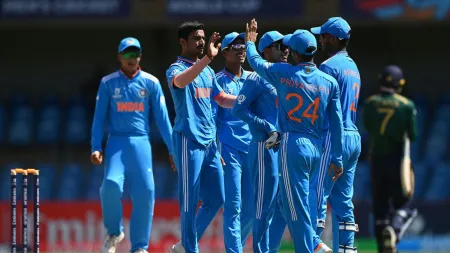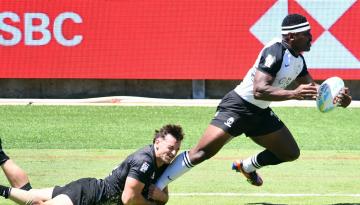How Aryna Sabalenka powered her way past Zheng Qinwen to defend Australian Open crown
Precious few tennis players in the world hit a ball as hard as Aryna Sabalenka. Even fewer, perhaps nobody, commit to the level of all-out aggression that the Belarusian World No.2 produces on every point, in every match, every week.
As all power players have had to do to excel on the big stage, Sabalenka’s consistency at the biggest tournaments are a product of her building a more well-rounded game with the mental resilience to deal with setbacks and emotional composure during big moments. But when she’s on song, it is the sheer ferocity of her groundstrokes, the power that comes from her racquet that make so many of her shots unreturnable, that makes her the toughest prospect to deal with on tour.

And just as each of her previous six opponents had done in what had been a flawless campaign, Zheng Qinwen, the 12th seeded 21-year-old from China, was forced to contend with, and bleakly succumbed, to that ferocity as Sabalenka raced to a 6-3, 6-2 win to defend her Australian Open title on Saturday.
Aryna Sabalenka HITS DIFFERENT 🐯 💪 pic.twitter.com/8xBPLCz0Rh
— #AusOpen (@AustralianOpen) January 27, 2024
The Belarusian became the first women’s player to defend a Grand Slam singles title since her compatriot Victoria Azarenka did so in Melbourne Park itself back in 2013. Sabalenka won the second Major, and 14th tour-level title, of her career.
Unlike her maiden triumph in Melbourne last year – where she had to deal with some tricky opponents and had to overturn a one-set deficit in an epic final full of twists and turns and top-tier shotmaking against Elena Rybakina – Sabalenka was simply unmatched this year. She did not drop a single set, and only lost 31 games (second-lowest in tournament history).
1974 ➡️ 2024#AusOpen • #AO2024 pic.twitter.com/YmPSrh7bSc
— #AusOpen (@AustralianOpen) January 27, 2024
Zheng made history on Saturday, becoming only the second Chinese player, after Li Na, to reach a singles Major final, representing a rising tennis nation. She will go into the top 10 of the rankings on Monday. The 21-year-old has a game with a high ceiling, with an impressive topspin-laden forehand and a big serve. Having found her way to the final in an inexplicably open half of the draw where the top players fell early, Zheng did not even have to face a top 50 player en route to the final.
Ultimately, the test against Sabalenka proved to be one step too high. The scoreline did not flatter the dominant Belarusian, as Zheng failed to cope with the power from the other side of the net, make enough tactical adjustments to throw something new at her opponent, or even be an overall resilient presence.
We are who we are because of those who support and believe in us.
Much love, @SabalenkaA!#AusOpen • #AO2024 pic.twitter.com/ckqrGibEBA
— #AusOpen (@AustralianOpen) January 27, 2024
Sabalenka possesses an uncanny ability to shorten points. Her massive serve and forehand combination, aggressive return strategies, and potent backhand tends to either find a winner or forced error early into most points. Used to blowing players away in rallies, the most useful coping mechanism against her tends to be brought out by elite, agile defenders, like Coco Gauff had done to recover from one set down to beat her at last year’s US Open final.
Gauff stuck around in rallies and made Sabalenka often play extra shots to win a point, testing her rally tolerance and extracting errors. It was the same playbook she used in the duo’s semifinal on Thursday, which, while she won in straight sets, was Sabalenka’s toughest assignment this fortnight.
Zheng could do none of the above. She was behind from first point to last, dropping her serve in the first game of each set, and never threatening to put a run together, or even defend well by elongating rallies. Of the 108 points played on Saturday, 80 were four shots or less, and Sabalenka won 46 of them. Of the 24 rallies that were five-eight shots, Sabalenka won 14 of those too.
14 sets played, 14 sets won, the reigning champion retains her 👑!
Queen Aryna's second coronation caps a perfect fortnight at Melbourne Park.@SabalenkaA • @wwos • @espn • @eurosport • @wowowtennis pic.twitter.com/x7639RQr84
— #AusOpen (@AustralianOpen) January 27, 2024
The Belarusian’s return strategy has been phenomenal this year, stepping into the baseline and going for big shots whenever she smells blood. And it was the same in the final. She won 3 out of 8 return games on Saturday, meaning she has won more than half – 31 out of 56 return games (55.35%) – throughout the tournament.
While the rankings may not say so, with Iga Swiatek stealing the World No. 1 spot at the end of last year despite Sabalenka spending more time in it, it is hard to argue that the Belarusian is the best player in the world, not just on form but also consistency at the biggest tournaments.
Women’s tennis has been known to throw up chaotic results over the past few years but Sabalenka has reached at least the semifinal at each of the last 6 Grand Slams. Even as each of her title rivals bowed out of the tournament early, Sabalenka continued her peerless march towards the title, failing to buckle under the pressure of defending her maiden Major, arriving in each match as the favourite to win.
Sabalenka had for long been considered one of the biggest tennis talents, the destructive power of her shotmaking had always been hard to look away from. But, by the beginning of 2022, despite being an established top 10 player, she would often get lost at the business end of tournaments. She tended to give away leads, her serve would combust – leading to chart-topping double fault numbers (one time as high as 24 in a match) – and there was a lack of competitive edge.
Not only has she worked hard to make improvements on serve and return and develop a more well-rounded game, but also developed a mental resilience to return week after week to produce her best tennis despite losing some tense, heartbreaking matches deep into the biggest tournaments last year.
It would not be far-fetched, then, to harbour expectations of seeing her play, and dominate, many more of these big finals in the biggest tournaments in the near future.
Disclaimer: The copyright of this article belongs to the original author. Reposting this article is solely for the purpose of information dissemination and does not constitute any investment advice. If there is any infringement, please contact us immediately. We will make corrections or deletions as necessary. Thank you.





